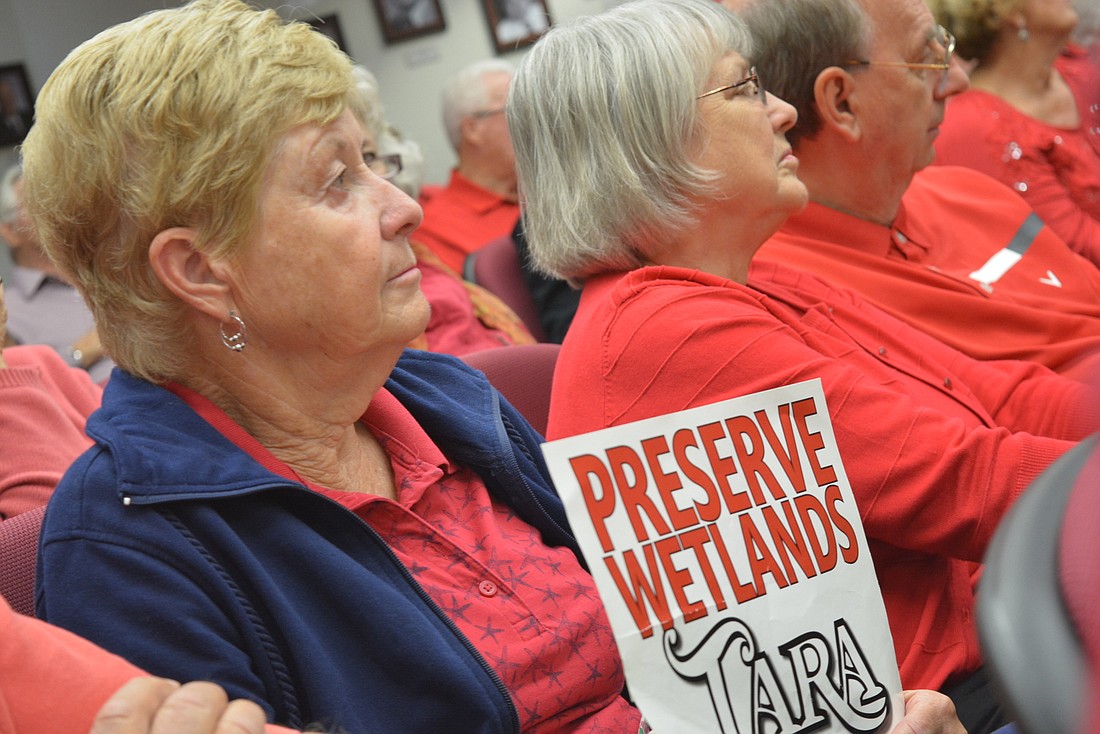- November 15, 2024
-
-
Loading

Loading

John Leone, president of the Tara Master Association, doesn’t love the changes Manatee County commissioners will consider Sept. 5, but he finds them palatable.
At that time, commissioners will consider changing land regulations and maps associated with the overall Tara development to allow residential or residential-support uses only — such as houses, day care centers and schools — at the entrance to the community at the
northwest corner of Tara Boulevard and State Road 70.
Although Leone and many of his fellow Tara residents would like to see no development in that area, as it stands now in terms of land regulations and maps, the commissioners have been embroiled in a seven-year legal battle with Tara’s developer, Lake Lincoln.
Lake Lincoln has been arguing it has the right to put 19,500 square feet of commercial development there.
“When the dust settles, we’ll be looking at residential, and we support residential uses there,” Leone said.
The dust isn’t likely to settle even if commissioners approve the new uses. Lake Lincoln attorney Bill Moore said his client opposes the change.
“We don’t think a residential use is the most appropriate use for that site,” he said.
A BRIEF HISTORY
In April 2010, Tara’s developer Lake Lincoln LLC asked Manatee County to allow changes to its overall development plan for the Tara community. It sought to trade unbuilt residential units for other commercial opportunities, including mini warehouse space and an adult assisted-living facility. Although the board granted those changes, it denied Lake Lincoln’s request to create a new 3.3-acre subparcel at the northwest corner of Tara Boulevard and S.R. 70 and put a commercial building there.
In May 2012, Lake Lincoln filed a lawsuit against Manatee County alleging it had been stripped of its property rights.
Manatee County and Lake Lincoln had been prepared to settle the case in June 2017, with the county allowing 19,500 square feet of commercial development. However, residents of Tara interceded. They argued the settlement agreement violated the county’s land development code.
In August 2018 after hearing from all parties, Manatee County 12th Judicial Circuit Judge Lon Arend asked county commissioners to reconsider the settlement.
The board — which had two new members, Misty Servia and Reggie Bellamy, since the settlement was reached — voted 4-3 to reject it and to instead direct its staff to prepare to vote the regulation changes necessary to allow residential and residential-support uses on that property.
CASE BASICS
Tara developer Lake Lincoln LLC in 2010 asked Manatee County to create a new 3.3-acre subparcel at the southwest corner of Tara Boulevard and S.R. 70 and to move entitlements there from other portions of the overall 1,120-acre development. Entitlements included a maximum 300-bed, adult assisted-living facility; unbuilt residential units and residential-support uses; a maximum of 19,500 square feet of commercial uses; and an allowance of a 1-acre wetland impact with corresponding mitigation. Manatee County commissioners denied the request.
Lake Lincoln’s complaint was that the denial violated the developer’s property rights under the Bert J. Harris Jr. Property Rights Protection Act, revoked Lake Lincoln’s rights to develop its property and deprived Lake Lincoln of due process.
The county’s defense was that the complainant did not submit an application for uses allowed under existing zoning. The property previously had no entitlements assigned to it, so the defense claims there should be no expectation of its development.
WHAT’S AT STAKE
Tara’s developer, Lake Lincoln, currently is not allowed any development on property it owns at the southwest corner of Tara Boulevard and S.R. 70. It claims Manatee County has stripped it of its right to use the property. It believes commercial zoning is most appropriate because there are commercial uses at every other corner of the Tara/Creekwood Boulevard and S.R. 70 intersection. It opposes residential and residential-support uses as “too restrictive,” Moore said, adding if commissioners make the change, he likely will amend Lake Lincoln’s complaint, but it would not eliminate the claim to damages.
Manatee County has defended its denial of Lake Lincoln’s request since 2012. Providing some alternative for the developer could improve its case in court, however the lawsuit continues. The county attorney’s office declined to comment for this story.
Residents of Tara are concerned any development on the parcel poses traffic and safety issues, will cause drainage and stormwater problems and will ruin the aesthetics of Tara’s entrance. They believe commercial development will be more impactful and dangerous than residential and have agreed to support residential and residential-support uses.
Other concerns
Attorney Robert Lincoln represents the Tara Master Association, the Tara Golf and Country Club, and Fairway Gardens II at Tara Condominium Association.
At an Aug. 1 meeting, he asked commissioners not only to support the land-use change but also to find a way to clearly identify wetlands and other nondeveloped land on maps associated with the project.
He said part of the problem related to the Lake Lincoln case is that boundaries for open space, such as wetlands and golf courses, are “unclear on a mapping level.” This causes a problem for older communities including Tara because as time progresses and the community is built out, development patterns sometimes leave developers with leftover development rights.
For example, a developer might be approved to build 800 homes but only builds 600. Because open space is not clearly identified, a developer could come back and seek to build the remaining 200 homes on lands previously considered “open space” but not specifically labeled as such on a development map.
Lincoln said the case itself indicates mapping is an issue.
“[Developers are] now arguing as long as they don’t go below the minimum open space requirements [in the code], they can change the fundamental aspects of [planned development],” Lincoln said.